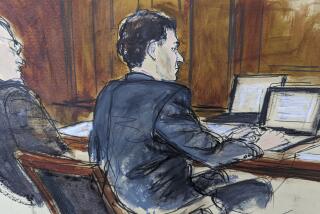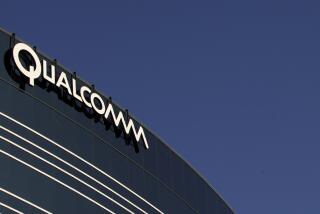Testimony ends in trial of ex-Broadcom exec William Ruehle
Testimony concluded Thursday in the criminal trial of Broadcom Corp.’s former Chief Financial Officer William J. Ruehle, who is accused of conspiring to hide billions of dollars in compensation paid to the Irvine chip developer’s employees.
U.S. District Judge Cormac J. Carney instructed jurors to return to his Santa Ana courtroom Dec. 17 for closing arguments.
The judge scheduled a Tuesday hearing to consider a defense motion to dismiss the case against Ruehle for insufficient evidence.
Ruehle, 67, has pleaded not guilty to 14 counts of fraud, conspiracy, falsifying Broadcom’s books and lying to securities regulators.
Federal prosecutors allege that Ruehle conspired with the Irvine chip company’s co-founders, Henry Samueli and Henry T. Nicholas III, to backdate employee stock options -- making them more valuable -- without disclosing the compensation in regulatory filings.
Ruehle’s attorney, Richard Marmaro, has said his client made the same innocent mistakes that executives at about 200 other companies did before the rules governing stock option accounting were clarified in 2005.
The prosecution’s case took a significant blow Wednesday when Carney dismissed Samueli’s prior guilty plea to a single count of lying to the Securities and Exchange Commission, ruling that the evidence showed he had not committed a crime.
That decision came moments after Samueli, owner of the Anaheim Ducks hockey team, spent two days testifying in Ruehle’s case.
The judge said that though Samueli may have been evasive with SEC regulators, he did not believe he had provided materially false testimony, the basis for the one charge to which he had pleaded guilty.
Samueli, 55, had pleaded guilty to the single charge last year and agreed to pay a $12-million fine with no jail time. Carney declined to accept that plea agreement, saying he wanted to sentence Samueli after listening to evidence in the other trials.
It has been a difficult two weeks for prosecutors in the Broadcom case.
Carney told the jury last week that Assistant U.S. Atty. Andrew Stolper committed misconduct when he contacted the lawyer for a witness in the Ruehle case and said the witness could face perjury charges if he testified the same way he had during an SEC deposition.
The judge said the contact amounted to an attempt to influence a witness’ testimony.
On top of that, the prosecutor admitted in court Wednesday that he had improperly told reporters for The Times and the Wall Street Journal in 2007 that his office was having difficulty getting Samueli to cooperate during the options investigation.
His office removed him from the Samueli investigation in 2007 and he was not in court when Samueli testified this week.
After throwing out Samueli’s case, the judge said he believed that there had been prosecutorial misconduct in the case and that he would take undefined action at a later date.
Nicholas is scheduled to stand trial in February in the stock-options case. He faces a separate trial on charges that he supplied illegal drugs to associates.
More to Read
Inside the business of entertainment
The Wide Shot brings you news, analysis and insights on everything from streaming wars to production — and what it all means for the future.
You may occasionally receive promotional content from the Los Angeles Times.










